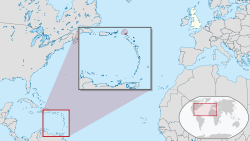Top Qs
Timeline
Chat
Perspective
LGBTQ rights in Anguilla
From Wikipedia, the free encyclopedia
Remove ads
Lesbian, gay, bisexual, and transgender (LGBT) persons in Anguilla face legal challenges not experienced by non-LGBTQ residents. Same-sex sexual activity is legal in Anguilla, but same-sex couples cannot marry or obtain civil partnerships. Anguillian law does not forbid discrimination based on sexual orientation or gender identity.
Remove ads
Law regarding same-sex sexual activity
Same-sex sexual activities have been legal in Anguilla since 2001. The legalisation of homosexuality was the result of an order of the Privy Council of the United Kingdom and affected the laws in four other overseas territories of the United Kingdom.[1]
The age of consent is higher for homosexuals (18) than it is for heterosexuals (16).[2]
Recognition of same-sex relationships

Same-sex marriage
Unregistered cohabitation
No recognition of same-sex couples
Constitutional ban on same-sex marriage
Same-sex sexual activity illegal but penalties not enforced
Same-sex marriage and civil unions are not legal in Anguilla, and it is one of the British overseas territories not to have legislated for civil partnerships. Non-legal ceremonies of same-sex couples have occurred on the island.[3]
The Marriage Act states that "'marriage' means the union of a man and a woman as husband and wife".[4]
Remove ads
Discrimination protections
No known legislative protections exist for LGBT people in Anguilla's local laws.[5] The Constitution of Anguilla outlaws discrimination on the basis of "race, political opinions, colour, creed, sex or place of origin", though makes no mention of sexual orientation or gender identity.[6]
Living conditions
Due to Anguilla's small population, there is virtually no gay scene on the island. There are no gay organisations, venues, bars and clubs, or pride events. A small protest occurred on 17 May 2011 in The Valley for the International Day Against Homophobia, Transphobia and Biphobia.[7]
Several same-sex couples who have travelled to the island on vacation report that the island is "gay-friendly" and has "warm people, the best beaches and sunset in the world, and fantastic restaurants", but also "very quiet".[7] The couples further said that "nobody was discriminatory in any way". However, the situation for locals might be different. Anguilla, much like other Caribbean islands, is believed to have a "subdued and subtle climate of homophobia", which has contributed to secrecy among LGBT locals.[7]
Remove ads
Summary table
| Same-sex sexual activity legal | |
| Equal age of consent | |
| Anti-discrimination laws in employment | |
| Anti-discrimination laws in the provision of goods and services | |
| Anti-discrimination laws in all other areas (incl. indirect discrimination, hate speech) | |
| Same-sex marriage | |
| Recognition of same-sex couples | |
| Stepchild adoption by same-sex couples | |
| Joint adoption by same-sex couples | |
| LGBT people allowed to serve openly in the military | |
| Right to change legal gender | |
| Access to IVF for lesbians and automatic parenthood for both spouses after birth | |
| Commercial surrogacy for gay male couples | |
| MSMs allowed to donate blood |
Remove ads
See also
References
Wikiwand - on
Seamless Wikipedia browsing. On steroids.
Remove ads

